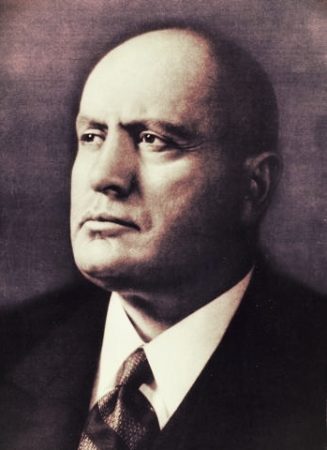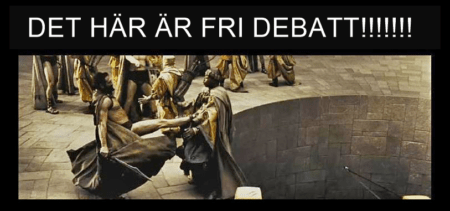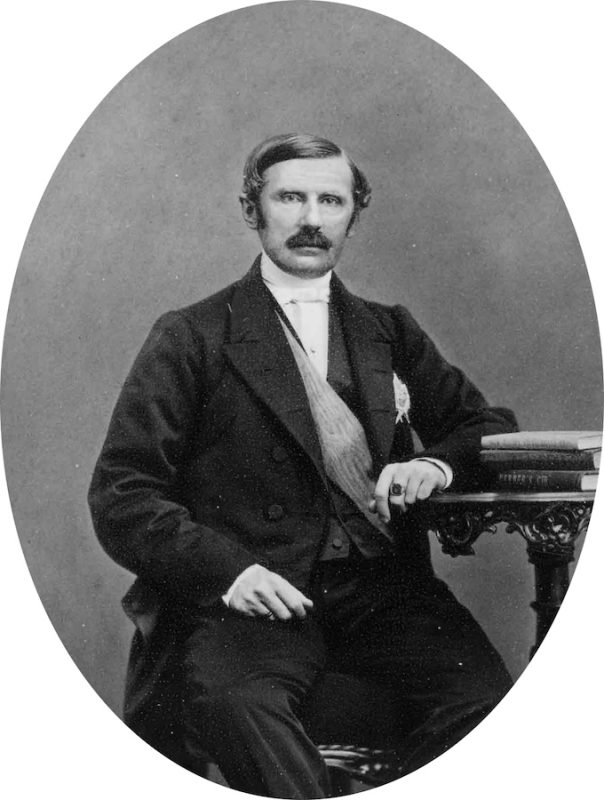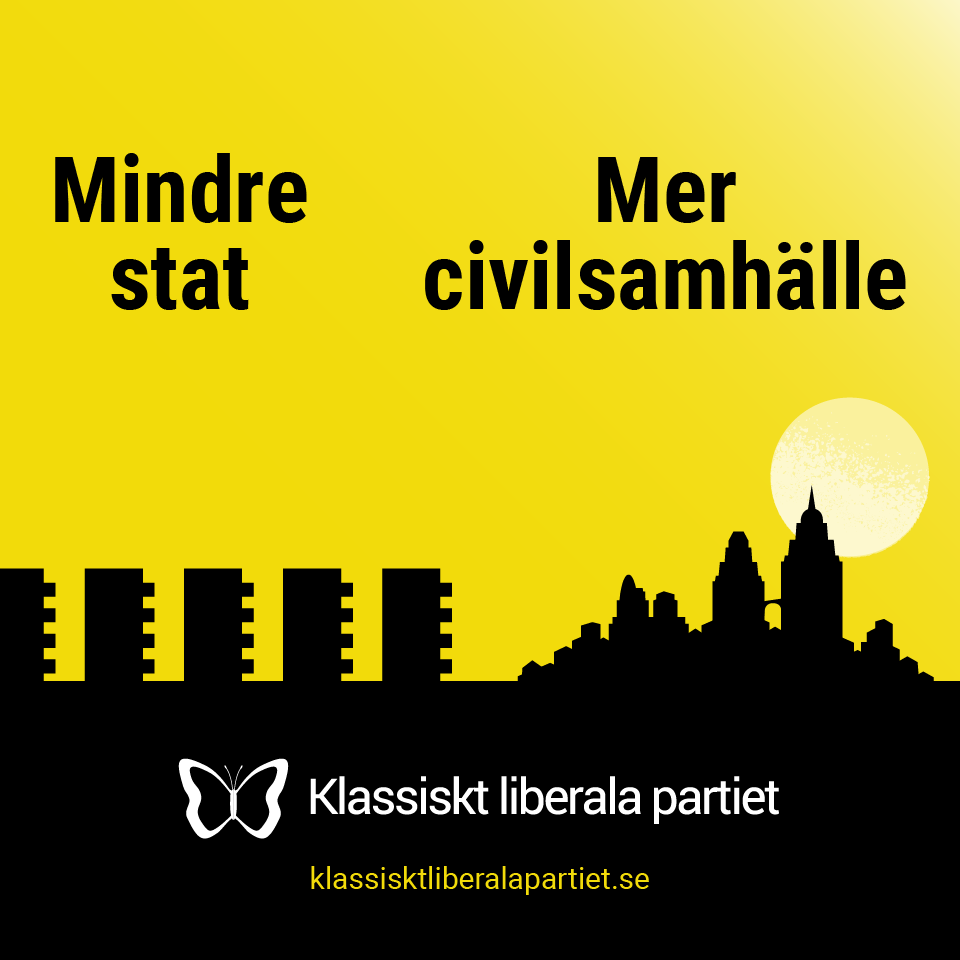
Efter att ha avhandlat böcker skrivna av flintskalliga despoter[1] och långhåriga politiska tänkare [2] så är det dags för ännu en allmänbildande skrift, Fascismens doktrin av Mussolini och Gentile [3]. Ett typisk liberalt synsätt är att fascister bara är socialister. Liberalen utvärderar nämligen ideologier enligt en axel under vilket det står ”statens storlek” och jag kan förvisso inte helt förringa det synsättet, efter kriget så anammade trots allt giganter som Mises [4] och Erik von Kuehnelt-Leddihn [5] just ett sådant synsätt och kallade fascismen för en sorts socialism. Man tappar dock alla slags nyanser och Mises själv skrev följande under mellankrigstiden [6]:
It cannot be denied that Fascism and similar movements aiming at the establishment of dictatorships are full of the best intentions and that their intervention has, for the moment, saved European civilization. The merit that Fascism has thereby won for itself will live on eternally in history. But though its policy has brought salvation for the moment, it is not of the kind which could promise continued success. Fascism was an emergency makeshift. To view it as something more would be a fatal error.
Vilka var det fascismen hade räddat civilisationen från enligt Mises? Jo socialisterna! Det bör få varje tänkande människa att fundera över hur fascismen egentligen skiljer sig från socialismen. Det är dock lättare sagt än gjort givet att innebörden av ordet fascist idag blott är någon som står till höger om Gudrun Schyman och det är ett ord som vi betingats att känslomässigt reagera på sedan dagis. Men This Is Fri Debatt och vi är inte rädda för att gå full fash baby!

Men var ska man vända sig för att lära sig något om fascismen? Är det till de kunniga politiska experterna vid Södertörns Högskola? Kanske vi bör ringa Sveriges främsta expert på Fascismen, Arnstad? Nej jag tror faktiskt att jag hellre dyker ner i källan, direkt till den skrift som Sua Eccellenza Benito Mussolini, Capo del Governo, Duce del Fascismo e Fondatore dell’Impero i egen hög person har författat (nåja i samarbete med Gentile) och frågan vi alla ställer oss är hur brun jag egentligen är när jag väl kommer upp och hämtar andan? Låt oss ta reda på det!
Fascismens doktrin är bara tjugoen sidor lång och man slukar den i en sittning utan några större problem, den är väldigt välskriven och språket flyter på bra. Il Duce besatt uppenbarligen en större författartalang än både Reinfeldt och Gaddafi, för att inte tala om Marx, vilket kanske inte är så konstigt då han var en journalist under en stor del av sitt liv och dessutom ansågs vara en beläst karl. Hans doktrinen går från högt till lågt, ofta nickar jag instämmande och bitvis förfasas jag, men det är en skrift som greppar tag i en. Känslan som infaller är totalt annorlunda den man får när man läser Det kommunistiska manifestet [7], den hemfaller aldrig till gnäll utan förklarar hur man med kraft ska greppa tag i situationen. Så låt oss titta på lite stycken ur texten.
Mussolini prisar sig först och främst för att vara en handlingens man och handling är vad han ser som fascismens kännetecken, det är inte en skrivbordsprodukt utan en tanke som utvecklats under en tid då fascisterna slogs mot kommunisterna ute på gatorna, en tid då socialister beväpnade med maskingevär ockuperade fabriker (något som lite diskret brukar glömmas bort i historieundervisningen):
Fascism was not the nursling of a doctrine previously drafted at a desk; it was born of the need of action, and was action; it was not a party but, in the first two years, an anti-party and a movement.
Mussolini förkastar även den materialistiska syn på världen som kännetecknar socialismen och liberalismen och till skillnad från de två ideologierna så vill han definitivt inte kasta all kultur och alla traditioner överbord för att skapa den nya människan.
Thus many of the practical expressions of Fascism such as party organization, system of education, and discipline can only be understood when considered in relation to its general attitude toward life. A spiritual attitude. Fascism sees in the world not only those superficial, material aspects in which man appears as an individual, standing by himself, self-centered, subject to natural law, which instinctively urges him toward a life of selfish momentary pleasure; it sees not only the individual but the nation and the country; individuals and generations bound together by a moral law, with common traditions and a mission which suppressing the instinct for life closed in a brief circle of pleasure, builds up a higher life, founded on duty, a life free from the limitations of time and space, in which the individual, by self sacrifice, the renunciation of self-interest, by death itself, can achieve that purely spiritual existence in which his value as a man consists.
Man kan säga att Mussolini var Hans Roslings antites och Mussolini skulle förmodligen inte ha försökt värdera världens tillstånd baserat på hur många tvättmaskiner där finns:
Fascism denies the materialistic conception of happiness as a possibility, and abandons it to the economists of the mid-eighteenth century. This means that Fascism denies the equation: well-being = happiness, which sees in men mere animals, content when they can feed and fatten, thus reducing them to a vegetative existence pure and simple.
Fascismen ger inte heller mycket för allas lika värde eller demokratin:
After socialism, Fascism trains its guns on the whole block of democratic ideologies, and rejects both their premises and their practical applications and implements. Fascism denies that numbers, as such, can be the determining factor in human society; it denies the right of numbers to govern by means of periodical consultations; it asserts the irremediable and fertile and beneficent inequality of men who cannot be leveled by any such mechanical and extrinsic device as universal suffrage. Democratic regimes may be described as those under which the people are,
from time to time, deluded into the belief that they exercise sovereignty, while all the time real sovereignty resides in and is exercised by other and sometimes irresponsible and secret forces. Democracy is a kingless regime infested by many kings who are sometimes more exclusive, tyrannical, and destructive than one, even if he be a tyrant.
Just demokratins inneboende självmotsägelser ser Mussolini som orsaken till att dåtidens alla politiska experiment var distinkt anti-liberala.
This explains why all the political experiments of our day are anti-liberal, and it is supremely ridiculous to endeavor on this account to put them outside the pale of history, as though history were a preserve set aside for liberalism and its adepts; as though liberalism were the last word in civilization beyond which no one can go.
Men trots det dåliga skick som liberalismen befann sig i då i Europa så visade det sig trots allt att det politiska experimenterandet var för intet,. Miljontals liv förlorades men i slutändan så lever vi i en värld där ingen i väst ens kan tänka icke-liberala tankar, friheten blev inte vad den var tänkt att vara efter liberalismens totala seger[8]. Man kan fråga sig hur det hade sett ut om någon del av det politiska experimenterandet hade innehållit mindre stat istället för mer… Nåja tillbaka till Musse.
Han spar inte något krut på att förklara hur viktigt kultur, spiritualitet och tradition är:
In the Fascist conception of history, man is man only by virtue of the spiritual process to which he contributes as a member of the family, the social group, the nation, and in function of history to which all nations bring their contribution. Hence the great value of tradition in records, in language, in customs, in the rules of social life. Outside history man is a nonentity. Fascism is therefore opposed to all individualistic abstractions based on eighteenth century materialism; and it is opposed to all Jacobinistic utopias and innovations.
Att fascismen hade rätt i detta, att människan är en icke-entitet utanför sin kultur och historia, har sedermera antropologi och psykologi visat [9] men myten om individen lever ännu stark. Fascismen vurmar inte heller för lättja, den ser snarare ett spirituellt värde i arbetet och kampen:
No action is exempt from moral judgment; no activity can be despoiled of the value which a moral purpose confers on all things. Therefore life, as conceived of by the Fascist, is serious, austere, and religious; all its manifestations are poised in a world sustained by moral forces and subject to spiritual responsibilities. The Fascist disdains an “easy” life
Struggle is at the origin of all things, for life is full of contrasts: there is love and hatred, white and black, day and night, good and evil; and until these contrasts achieve balance, struggle fatefully remains at the root of human nature. However, it is good for it to be so. Today we can indulge in wars, economic battles, conflicts of ideas, but if a day came to pass when struggle ceased to exist, that day would be tinged with melancholy; it would be a day of ruin, the day of ending.
You touch the core of Fascist philosophy. When recently a Finnish philosopher asked me to expound to him the significance of Fascism in one sentence, I wrote in German: We are against the “easy, life!
Här finns en skillnad mot socialismens drömvärld där alla kommer leva i överflöde, någon sådan framtid drömde Mussolini inte om. Men trots att varje handling, varje moment av livet, ska fyllas med seriositet och värdighet så ska kampen inte vara surmulen och deprimerad, fascismen framhäver att livet ska levas sorglöst och med lättsamhet, acceptans och stoicism.
I don’t care a damn „ (me ne frego) – the proud motto of the fighting squads scrawled by a wounded man on his bandages, is not only an act of philosophic stoicism, it sums up a doctrine which is not merely political: it is evidence of a fighting spirit which accepts all risks. It signifies new style of Italian life. The Fascist accepts and loves life; he rejects and despises suicide as cowardly. Life as he understands it means duty, elevation, conquest; life must be lofty and full, it must be lived for oneself but above all for others, both near bye and far off, present and future
Denna lättsamma men seriösa attityd till livet kan man finna både bland de gamla grekerna och våra egna vikingasagor, det är ett tidlöst ideal! Så långt så gott med andra ord, det finns väldigt lite av det jag citerat ovan som jag inte håller med om. Dagens individualism är ett skämt, demokrati är en fars och det finns nog inte en enda stor tänkare genom historien som inte kommit fram till att lättja är ett gift för själen. Fascismens syn på det goda livet verkar helt enkelt väldigt stoiskt, väldigt sympatiskt och väldigt lockande! Men var går det snett? Jo det går snett när Mussolini börjar prata om staten:
Here I wish to reaffirm solemnly our doctrine of the State. Here I wish to reaffirm with no weaker energy, the formula I expounded at the scala in Milan everything in the state, nothing against the State, nothing outside the state.
Anti-individualistic, the Fascist conception of life stresses the importance of the State and accepts the individual only in so far as his interests coincide with those of the State, which stands for the conscience and the universal, will of man as a historic entity.
Han gör även en observation som påminner mig om Ellul och Kaczynski men det låter som att Mussolini tycker det är av godo snarare än av ondo:
We were the first to state, in the face of demo liberal individualism, that the individual exists only in so far as he is within the State and subjected to the requirements of the state and that, as civilization assumes aspects which grow more and more complicated, individual freedom becomes more and more restricted.
Slutligen så har Mussolinis synen att fascismen är revolutionär snarare än konservativ, jag får inte ihop det med hans syn på kultur och tradition, detta är helt enkelt sunkigt progressivt och hör mer hemma i Obamas mun:
Fascism, in short, is not only a law-giver and a founder of institutions, but an educator and a promoter of spiritual life. It aims at refashioning not only the forms of life but their content – man, his character, and his faith. To achieve this propose it enforces discipline and uses authority, entering into the soul and ruling with undisputed sway.
Så efter att ha beställt en svart skjorta och gjort mig redo för att gå ut på gatan så måste jag motvilligt returnera skjortan, här skiljs våra vägar åt käre Benito, men skalar man bara bort etatismen från fascismen så har man något som faktiskt inte är helt tokigt. Det är någon slags kondensering av vad filosofer skrivit genom alla århundraden. Frågan är bara om något eget och unikt då kvarstår eller om det bara är en omformulering av exempelvis stoicismen? Jag blir definitivt intresserad av att läsa mer men nästa vecka får det bli Det kommunistiska manifestet som avhandlas.
Som slutcitat så väljer jag detta:
Race: it is a feeling and not a reality; 95 %, a feeling
Känner ni den kognitiva dissonansen komma krypandes? Är det Annie Lööf eller Benito som vi hör?
- Läsvärda böcker: Det sovande folket
- Läsvärda böcker – Gaddafis gröna bok
- Mussolini The Doctrine of Fascism
- Mises Planned Chaos
- Erik von Kuehnelt-Leddihn Liberty or Equality
- Mises Liberalism
- Marx Manifesto of the Communist
- Fnordspotting Den kamouflerade Liberalen
- Henrich The Secret of Our Success

En skopa reaktionär, en skopa libertarian och ett kryddmått primitivist.






